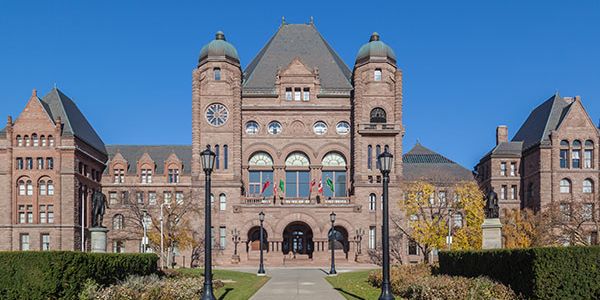In this edition:
- Ontario to require temp agencies and recruiters to be licensed in 2024
- Negotiations stall as retailers warn of continent-wide impact from strike at B.C. ports
- Province appoints team to oversee dissolution of Peel Region
- Gap between rich and poor widens at fastest pace on record
- Ottawa suspends advertising on Facebook, Instagram as Meta promises to block news
- Government delivers new Grocery Rebate to 11 million low- and modest-income Canadians

Ontario to require temp agencies and recruiters to be licensed in 2024
The Ontario government will require temporary help agencies (THAs) and recruiters to have a licence to operate in the province as of January 1, 2024. Inspections by Ministry of Labour, Immigration, Training and Skills Development officers have shown that multiple temporary help agencies in Ontario are illegally paying people below the minimum wage and denying other basic employment rights to gain an unfair competitive advantage over law-abiding agencies by undercutting rates, the government said in a statement issued today.
The government touted a possible benefit to employers, stating that many businesses and jobseekers in Ontario are often unaware if an agency or recruiter they are working with is meeting their employment standards obligations or has a history of violations. Employers will now be able to check the ministry’s online database before working with one, to see if they have met the province’s stringent licensing requirements.

Negotiations stall as retailers warn of continent-wide impact from strike at B.C. ports
As the port workers’ strike in British Columbia goes into its third day, retail associations and mayors alike are issuing warnings about the likely impact across the country — and even the continent.
Greg Wilson, the Retail Council of Canada’s director of government relations for B.C., says the strike affects supply chains across the continent — a concern for retailers and consumers alike.
“There will be impacts North American-wide,” Wilson said in an interview with CBC News.
Province appoints team to oversee dissolution of Peel Region
Ontario is appointing five members to a transition board that will make recommendations to the government on a range of restructuring matters related to the dissolution of the Regional Municipality of Peel in order to make Mississauga, Brampton and Caledon independent municipalities by January 1, 2025.
The five members who have been appointed to the board bring a range of experience across the public and private sectors, including municipal government and administration, policing, business law and business management, infrastructure delivery and the provincial and federal governments.

Gap between rich and poor widens at fastest pace on record
The gap in net worth between the most and least wealthy increased by 1.1 percentage points in the first quarter of 2023 relative to the same quarter a year earlier, new Statistics Canada data has revealed. This was the fastest increase on record for these estimates, which date back to 2010. In contrast, the wealth gap declined by 1.6 percentage points over the two-year period from the first quarter of 2020 to the first quarter of 2022. Despite recent increases in the wealth gap, it remained lower in the first quarter of 2023 (65.1 percentage points) relative to the first quarter of 2020 (65.6 percentage points).
The least wealthy were affected more by recent economic pressures, as they decreased their net worth by 13.8% in the first quarter of 2023 relative to the same quarter a year earlier. This reduction represented more than triple the rate of decrease for the wealthiest (-3.8%).
Ottawa suspends advertising on Facebook, Instagram as Meta promises to block news
Heritage Minister Pablo Rodriguez says the federal government will stop advertising on Facebook and Instagram.
The decision comes after both Meta Platforms Inc. promised to block Canadian news content on its Facebook and Instagram platforms in response to Canada’s recently passed Online News Act.
The new law will require tech giants pay media outlets for content they share or otherwise repurpose on their platforms.
Rodriguez says the decision from Meta, which is already blocking content for some users as part of a test that began before the bill passed, is “unreasonable” and “irresponsible” and as a result Canada will stop advertising on their platforms.
Government delivers new Grocery Rebate to 11 million low- and modest-income Canadians
Today, the Honourable Randy Boissonnault, Minister of Tourism and Associate Minister of Finance announced that 11 million low- and modest-income Canadians and families will begin receiving their new, one-time Grocery Rebate.
This targeted inflation relief for vulnerable Canadians provides eligible couples with two children up to an extra $467; single Canadians without children up to an extra $234; and seniors with an extra $225, on average. By targeting the Grocery Rebate to the Canadians who need it most, the government aims to deliver important relief while maintaining Canada’s AAA credit rating and strong track record of fiscal responsibility.
Did you know?
Half of working Africans work in agriculture.
Focus on Climate
How Indigenous economic development corporations can support a just, low-carbon energy transition
There are over 50,000 Indigenous businesses in Canada today. According to the 2020 census, the Indigenous economy generated a gross domestic product of $48.9 billion dollars. A growing number of First Nations, Inuit and Métis communities are establishing economic development corporations (EDCs), of which many are involved in the renewable energy sector.
Indigenous EDCs exist across a range of industries such as retail, forestry, fisheries, energy, mining, construction and hospitality. They have the potential to be major drivers for economic growth in Indigenous communities.
The role of Indigenous EDCs in the renewable energy sector has so far been unclear. Canada’s energy industry is responsible for 80 per cent of the country’s greenhouse gas emissions. Increasing renewable energy production is an important part of reducing emissions.
Through the Daily Updates, the GNCC aims to deliver important business news in a timely manner. We disseminate all news and information we feel will be important to businesses. Inclusion in the Daily Update is not an endorsement by the GNCC.






